Medical Disclaimer: This article is for informational purposes only and does not replace professional veterinary advice. Always consult your veterinarian before starting any natural remedies for dog skin allergies.
Table of Contents
Is your dog constantly scratching, licking, or chewing their skin? As a Canadian veterinarian, I’ve seen countless pet parents feel frustrated watching their dogs suffer from itchy, inflamed skin. The good news? There are safe, effective natural remedies for dog skin allergies that can provide real relief often without the side effects of pharmaceuticals.
Whether your pup’s discomfort stems from pollen, food sensitivities, or fleas, holistic solutions can help soothe irritated skin, support immune balance, and strengthen the skin barrier. In this guide, I’ll walk you through the best natural remedies for dog skin allergies from herbal soaks to immune-modulating supplements backed by both science and experience from my own veterinary practice.
✅ Key Takeaways
- Natural remedies for dog skin allergies can be highly effective when used correctly and with veterinary guidance.
- Weekly bathing with oatmeal or lipid-rich shampoos helps wash away allergens and calm inflamed skin.
- Herbal soaks (chamomile, green tea, calendula) and diluted apple cider vinegar can provide soothing topical relief.
- Supplements like omega-3s, colostrum, quercetin, and postbiotics support the gut-skin-immune axis and reduce inflammation.
- Always rule out infection or fleas before starting natural treatments, and never apply anything to broken skin.
- Improvements typically occur within 2–4 weeks monitor progress closely and consult your vet if symptoms worsen.
- These natural remedies for dog skin allergies are especially helpful in mild-to-moderate cases or alongside conventional therapies.
What Causes Dog Skin Allergies?
You can also see: https://doglifeexpert.com/tips-to-beat-flea-allergy-dermatitis-in-dogs/
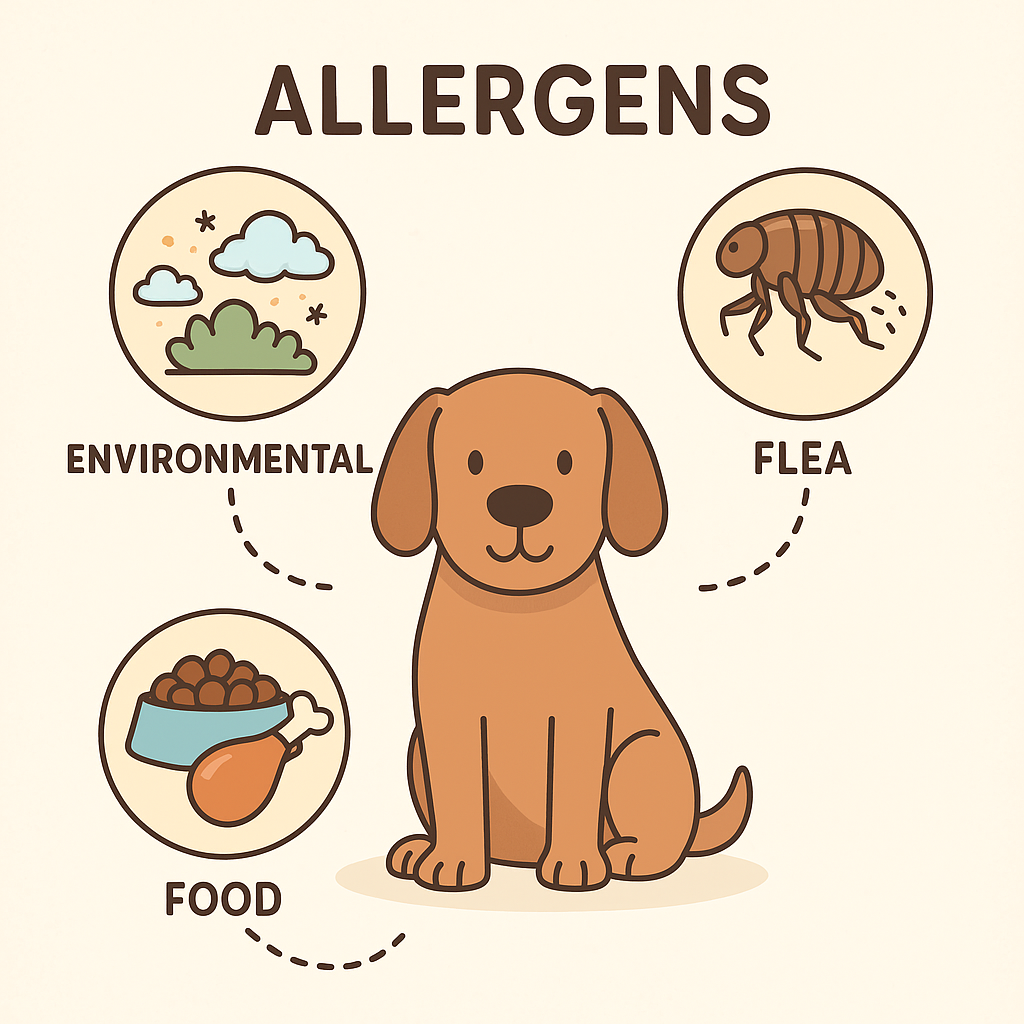
Dog skin allergies also known as canine atopic dermatitis are an immune system overreaction to usually harmless substances like pollen, dust mites, mold spores, or certain foods. These allergens trigger inflammation in the skin, leading to redness, itching, and chronic irritation. I often see dogs come into my Ottawa clinic during spring or fall with severe itching and paw licking, and seasonal allergies are a common culprit. Many of these cases respond well when we pair diagnosis with tailored natural remedies for dog skin allergies to reduce flare-ups and support recovery.
Common Causes Include:
- Environmental allergens (pollen, mold, dust mites)
MiDOG Diagnostics, 2023 - Food sensitivities (often chicken, beef, wheat, or dairy)
BioMed Central, 2015 - Flea allergy dermatitis (reaction to flea saliva)
- Contact dermatitis (irritants like cleaning products or lawn chemicals)
Signs Your Dog May Have Skin Allergies:
- Persistent itching or chewing
- Red or inflamed skin, especially around the ears, belly, or paws
- Hair loss or hot spots
- Recurring ear infections
- Odour or greasy skin (secondary yeast or bacterial infections)
Getting a veterinary diagnosis is key. I typically begin with a physical exam, skin cytology to rule out infection, and often a hypoallergenic food trial or allergy testing. Only after identifying the likely trigger do we begin tailoring natural remedies for dog skin allergies to the dog’s specific needs.
Natural Remedies That Bring Real Relief
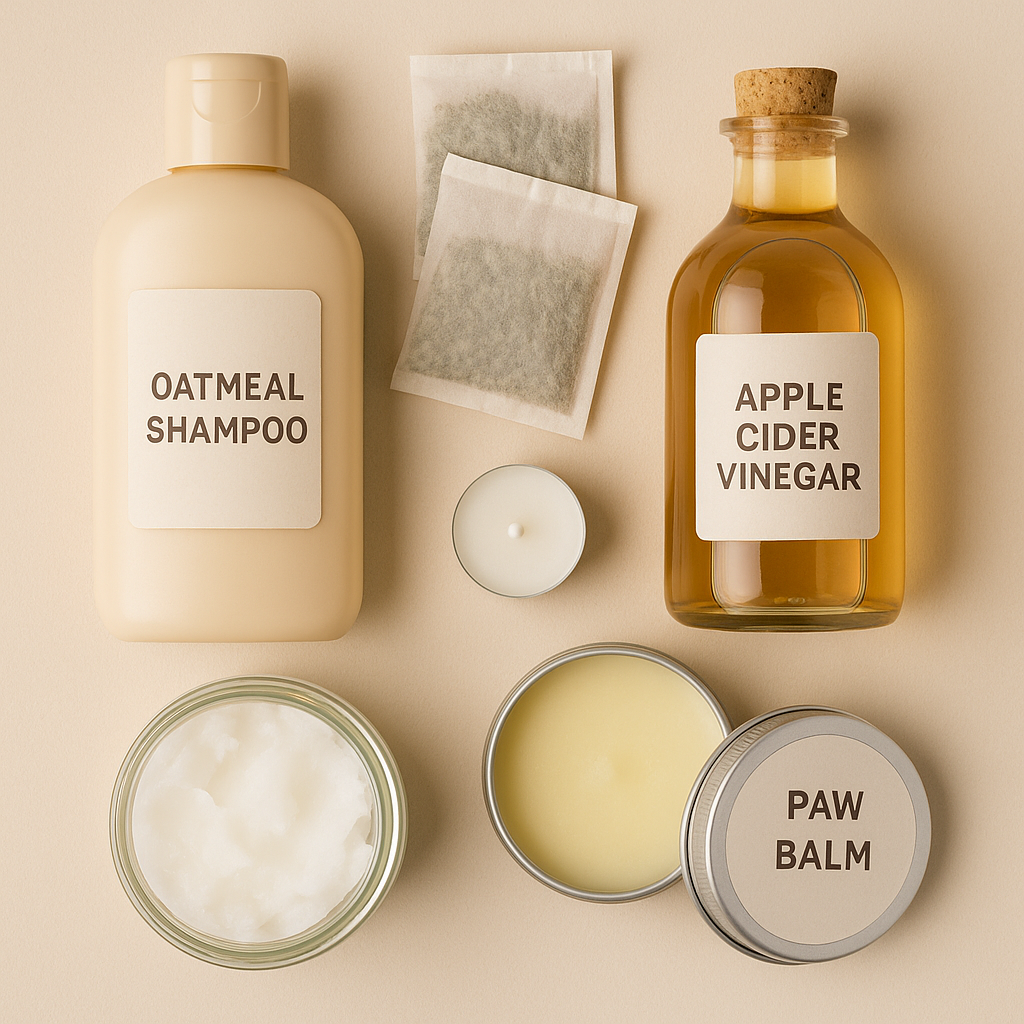
Treating dog allergies naturally means supporting the skin barrier, reducing inflammation, and removing allergens from the environment. Below are the most effective, vet-recommended natural remedies for dog skin allergies, based on both clinical experience and peer-reviewed research.
Natural Remedies That Bring Real Relief
Treating dog allergies naturally means supporting the skin barrier, reducing inflammation, and removing allergens from the environment. Below are the most effective, vet-recommended natural remedies for dog skin allergies, based on both clinical experience and peer-reviewed research.
1. Soothing Baths with Gentle, Oatmeal-Based Shampoos
Bathing your dog once or twice weekly can dramatically reduce allergen buildup on the skin. I often recommend unscented, lipid-replenishing shampoos which help restore the skin’s moisture barrier and reduce itchiness.
- Why it works: Washing away surface allergens and rehydrating dry, irritated skin
- Tip: Avoid shampoos with dyes, fragrances, or harsh detergents
[BioMed Central, 2015 PetMD, 2023]
2. Herbal Tea Soaks: Chamomile, Green Tea & Calendula
These herbs are known for their natural anti-inflammatory and antibacterial properties. I’ve used chamomile or calendula tea compresses on localized rashes and hotspots with excellent soothing results.
- Brew 3–4 tea bags in hot water, cool completely, and apply with a clean cloth
- Great for paws, bellies, and inner thighs
- Chamomile: Natural antihistamine; may reduce histamine release
- Green tea: Antioxidant and cooling
- Calendula: Speeds skin healing and reduces redness
AKC Pet Insurance, 2024 Nikolaus Nature, 2024
These herbal options are among the gentlest natural remedies for dog skin allergies perfect for early signs or localized irritation.
3. Apple Cider Vinegar (ACV) Spray
ACV (diluted 1:1 with water) can help combat yeast overgrowth and rebalance skin pH, particularly for dogs prone to ear and paw yeast infections.
- Apply with a spray bottle or cloth to clean, dry areas
- Let air-dry; do not rinse.
4. Coconut Oil for Skin Hydration
When used sparingly, virgin coconut oil offers antibacterial and antifungal benefits and soothes itchy, flaky skin.
- Apply a small amount to dry patches or paws
- Avoid overuse or ingestion, which may cause diarrhea in some dogs
Coconut oil is a classic favourite in many natural remedies for dog skin allergies, especially in winter or for dry-coated breeds.
5. Omega‑3 Fatty Acids and Essential Skin Nutrients
Adding omega-3s (like EPA and DHA from fish oil) to your dog’s diet helps reduce inflammation and supports skin barrier repair. I often see improvements in coat quality and reduced itching within a few weeks.
- Include fish oil, flaxseed oil, or EFA-rich veterinary diets
- Key vitamins: A, E, biotin, and zinc
When used consistently, these nutrients play a central role in natural remedies for dog skin allergies that address internal inflammation.
6. Immune-Supporting Supplements: Colostrum, Quercetin & Postbiotics
These options are often overlooked but have solid evidence for allergy support:
- Colostrum: Contains proline-rich polypeptides (PRPs) that help regulate immune response and decrease histamine activity
- Quercetin: A natural antihistamine and antioxidant often dubbed “nature’s Benadryl”
- Postbiotics: Gut-targeted ingredients shown in recent trials to improve skin condition within 14 days
[Dogs Naturally Magazine, 2023, The Times of India, 2024]
These internal supports are essential to any holistic plan using natural remedies for dog skin allergies, especially for systemic or recurring flare-ups.
7. Complementary Therapies: Herbal Anti-inflammatories & Acupuncture
Some pet owners find benefit from integrative options especially for chronic or seasonal cases.
- Nettle, turmeric, echinacea, and St. John’s Wort: Known to reduce itching and improve immune balance
- Acupuncture: Used by certified veterinary acupuncturists to help reduce systemic inflammation and itch signals [Dogs Naturally Magazine, 2023, The Times of India, 2024]
When combined thoughtfully, these therapies add depth and sustainability to long-term natural remedies for dog skin allergies.
Owner-Friendly Treatment Plan: Real-World Use
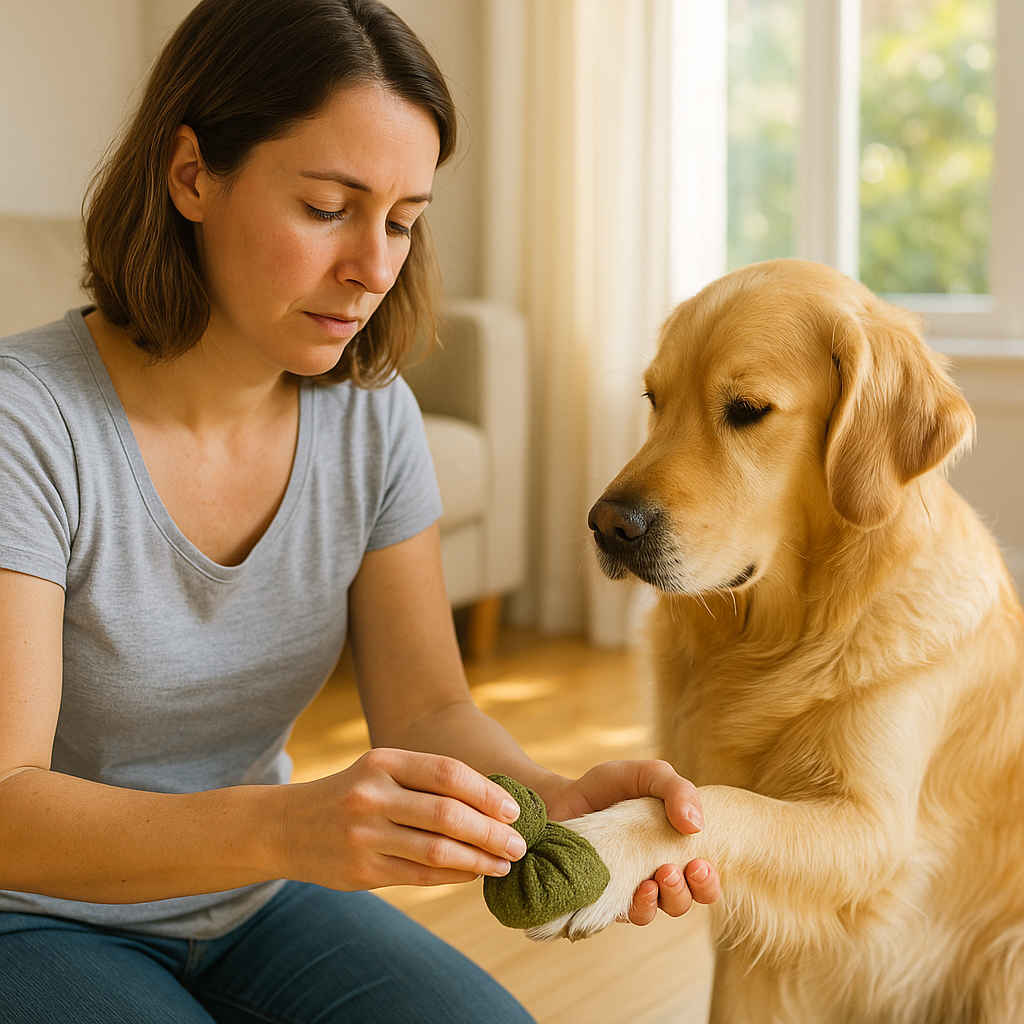
Managing dog skin allergies naturally can feel overwhelming, but breaking the process into steps makes it manageable and more effective. Here’s how I guide pet parents in my clinic to implement natural remedies for dog skin allergies safely and successfully.
Step 1: Get a Veterinary Diagnosis First
Before starting any remedy, rule out:
- Skin infections (bacterial, yeast) with skin cytology
- Fleas or mites
- Food allergies via elimination diet
- Underlying endocrine disorders (e.g., hypothyroidism)
Getting to the root cause ensures you choose remedies that truly help.
Step 2: Improve Skin Hygiene & Allergen Control
- Bathe weekly with a fragrance-free, oatmeal or emollient-rich shampoo
- Brush daily to remove dander and loose hair
- Wash dog bedding weekly in hot water
- Use HEPA filters and vacuum carpets frequently
[PMC, 2022, PetMD, 2024]
Step 3: Apply Natural Topical Soothers
- Use tea soaks (chamomile, calendula) on paws or irritated areas 2–3x/week
- ACV spray (only on unbroken skin) to manage yeast and itch
- Coconut oil sparingly on dry areas (watch for licking)
These topical natural remedies for dog skin allergies often show effects within a few uses.
Step 4: Add Gut & Immune Support
- Begin with colostrum, quercetin, or vet-recommended postbiotics after vet approval
- Add a high-quality fish oil (check for mercury testing and dosing)
- Consider switching to a limited-ingredient or hydrolyzed protein diet
These help address allergies systemically by calming immune overreaction.
Step 5: Consider Herbal or Holistic Therapies
For moderate or long-term cases:
- Ask your vet about turmeric, nettle, or St. John’s Wort in safe formulations
- Explore veterinary acupuncture for chronic itch or inflammation
[PMC, 2022, PetMD, 2024]
Step 6: Monitor Progress & Adjust Accordingly
Track changes weekly using a symptom tracker:
| Symptom | Week 1 | Week 2 | Week 3 | Week 4 |
|---|---|---|---|---|
| Itch severity (1–10) | 8 | 5 | 3 | 2 |
| Redness | High | Medium | Low | Minimal |
| Licking/scratching episodes | 10/day | 6/day | 3/day | 1/day |
If your dog worsens, or you see no change after 4 weeks, it’s time to revisit your vet and possibly incorporate conventional medications or allergy testing.
5-Minute Home Checklist for Allergy Dogs

Staying consistent with routine care can make a huge difference. Use this simple checklist daily or weekly to support your dog’s skin health:
| ✅ Task | Frequency | Why It Matters |
|---|---|---|
| Wipe paws with herbal tea or hypoallergenic wipes | After every walk | Removes outdoor allergens like pollen or grass |
| Brush coat gently | Daily | Reduces dander, loose fur, and allergen buildup |
| Wash dog bedding | Weekly | Prevents dust mites, mould, and bacteria buildup |
| Vacuum and mop pet areas | 2–3x/week | Removes environmental allergens and dander |
| Bathe with vet-recommended shampoo | Weekly | Soothes skin, restores barrier, removes allergens |
| Check ears and paws | Weekly | Early detection of yeast, redness, or sores |
| Apply topical soothers (tea or ACV) | As needed | Reduces localized itching and hot spots |
By staying on top of these small daily rituals, you’re giving your dog’s skin the best chance to heal and stay comfortable especially if you’re using natural remedies for dog skin allergies as your main management strategy.
Typical Canadian Costs for Natural Allergy Treatments
Many pet owners worry about costs when exploring alternative therapies. While natural remedies for dog skin allergies can be budget-friendly, here’s what you can realistically expect in Canada (based on 2024–2025 pricing):
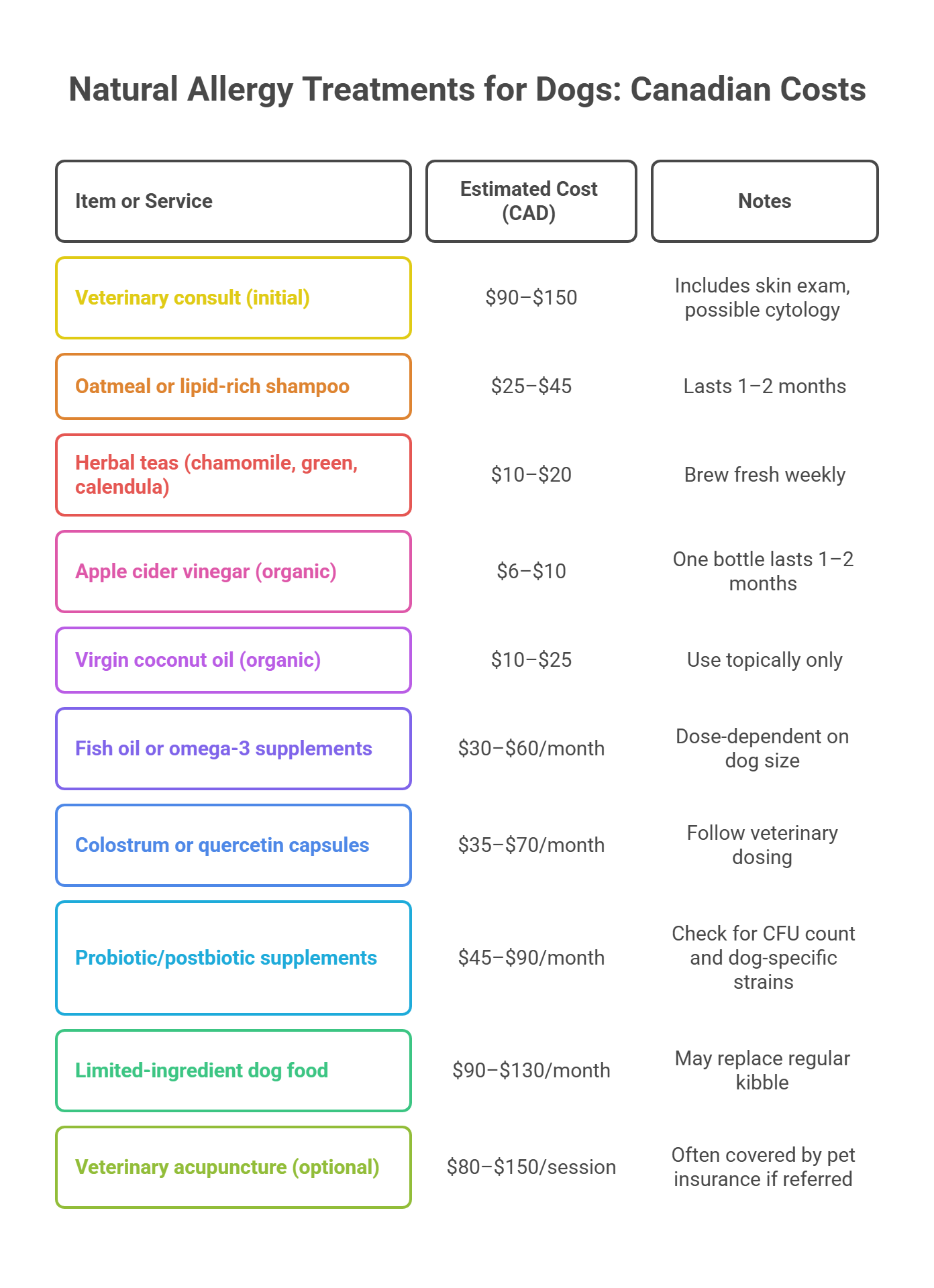
💡 Tip: Many remedies overlap with existing home items (tea, ACV, coconut oil), making them cost-efficient.
Prevention Tips for Chronic Allergy Dogs

Preventing flare-ups is just as important as treating symptoms. Once you find natural remedies for dog skin allergies that work for your pup, these steps can help keep their skin calm year-round.
1. Control Environmental Triggers
- Use HEPA air purifiers indoors
- Vacuum with a pet-specific filter
- Keep windows closed during high pollen days
- Rinse paws after outdoor walks with herbal soaks
2. Maintain a Skin-Supportive Diet
- Feed a balanced, hypoallergenic or limited-ingredient diet
- Ensure omega-3 intake is consistent
- Avoid known allergens (e.g., beef, chicken, dairy if sensitivity suspected)
3. Stick to a Gentle Grooming Routine
- Weekly bathing to wash off allergens
- Avoid perfumed or harsh grooming products
- Trim paw fur to prevent allergen trapping
4. Support the Immune System
- Maintain probiotic or postbiotic supplementation
- Use anti-inflammatory herbs like nettle or turmeric seasonally
- Avoid over-vaccination consult your vet on individualized protocols
5. Regular Vet Checkups
- Catch early signs of infection or flare-ups
- Update or adjust your allergy management plan as needed
By integrating these prevention strategies with ongoing natural remedies for dog skin allergies, many dogs live itch-free, happy lives even in high-allergen environments.
Cautions Before Trying Home Remedies

Although natural remedies for dog skin allergies are generally safe, they must be used with care especially when your dog is already inflamed or uncomfortable.
Cautions Before Trying Home Remedies
Avoid on Open Wounds or Hot Spots
Never apply ACV, herbs, or coconut oil to open wounds, raw skin, or bleeding areas. These can sting, worsen inflammation, and raise the risk of infection especially when the skin barrier is already compromised.
Always Patch Test First
Before using any topical treatment (e.g., tea soaks, oils, diluted ACV), test it on a small area of skin. Monitor for 12–24 hours for:
- Redness
- Swelling
- Increased itching
This is especially important when introducing natural remedies for dog skin allergies for the first time.
Watch for Sensitivities
Some dogs may be sensitive to certain herbs or supplements. Stop use and contact your vet if you notice:
- Vomiting
- Diarrhea
- Worsening itch or excessive licking
Not Every Dog Is a Good Candidate
Dogs with autoimmune disease, skin infections, or severe dermatitis may need conventional treatment before starting holistic options. In my practice, I often stabilize acute flare-ups before integrating natural supports.
If symptoms persist or worsen after 1–2 weeks, schedule a veterinary checkup.
Don’t Skip the Diagnosis
Home remedies can complement treatment, but they should never replace a proper veterinary diagnosis. Used wisely and under guidance, natural remedies for dog skin allergies can offer safe, lasting comfort especially when part of a well-rounded treatment plan.
Frequently Asked Questions (FAQs)
1. What is the most effective natural remedy for dog skin allergies?
There’s no one-size-fits-all, but bathing weekly with a gentle oatmeal-based shampoo and supplementing with omega-3 fatty acids is often the most effective combination. These natural remedies for dog skin allergies help reduce inflammation, support the skin barrier, and relieve itching in many dogs.
2. Can I use apple cider vinegar on my dog’s itchy skin?
Yes, but only on unbroken skin. A 50/50 dilution with water may help soothe mild itchiness and reduce yeast buildup. Always patch test first and avoid applying ACV to raw or inflamed areas.
3. Are dog skin allergies curable?
Not always, but they can be managed long-term. Identifying and avoiding the trigger, while using natural remedies for dog skin allergies, often leads to significant relief and fewer flare-ups.
4. Do food allergies cause skin issues in dogs?
Absolutely. Food sensitivities especially to chicken, beef, or grains are a common source of chronic skin irritation. An elimination diet trial, often paired with natural remedies for dog skin allergies, is a critical step in resolving symptoms.
5. How long do natural remedies take to work?
Most natural treatments show mild improvement within 7–14 days, with more noticeable results by 3–4 weeks. If your dog’s symptoms worsen or don’t improve, consult your veterinarian to reassess the treatment plan.
Final Thoughts: Finding Safe Relief That Lasts
Seeing your dog suffer from chronic itching, redness, and discomfort can be heartbreaking. Fortunately, with the right mix of veterinary guidance and consistent care, natural remedies for dog skin allergies can offer meaningful, long-lasting relief.
From oatmeal baths and herbal soaks to omega-3s and postbiotics, these approaches don’t just mask symptoms—they help rebalance your dog’s skin and immune system from the inside out. I’ve watched countless dogs in my own practice go from miserable to comfortable simply by following a structured natural allergy protocol.
Whether you’re managing seasonal itching or year-round sensitivities, these holistic tools can empower you to care for your dog gently, safely, and effectively. Your dog deserves to feel good in their own skin naturally.

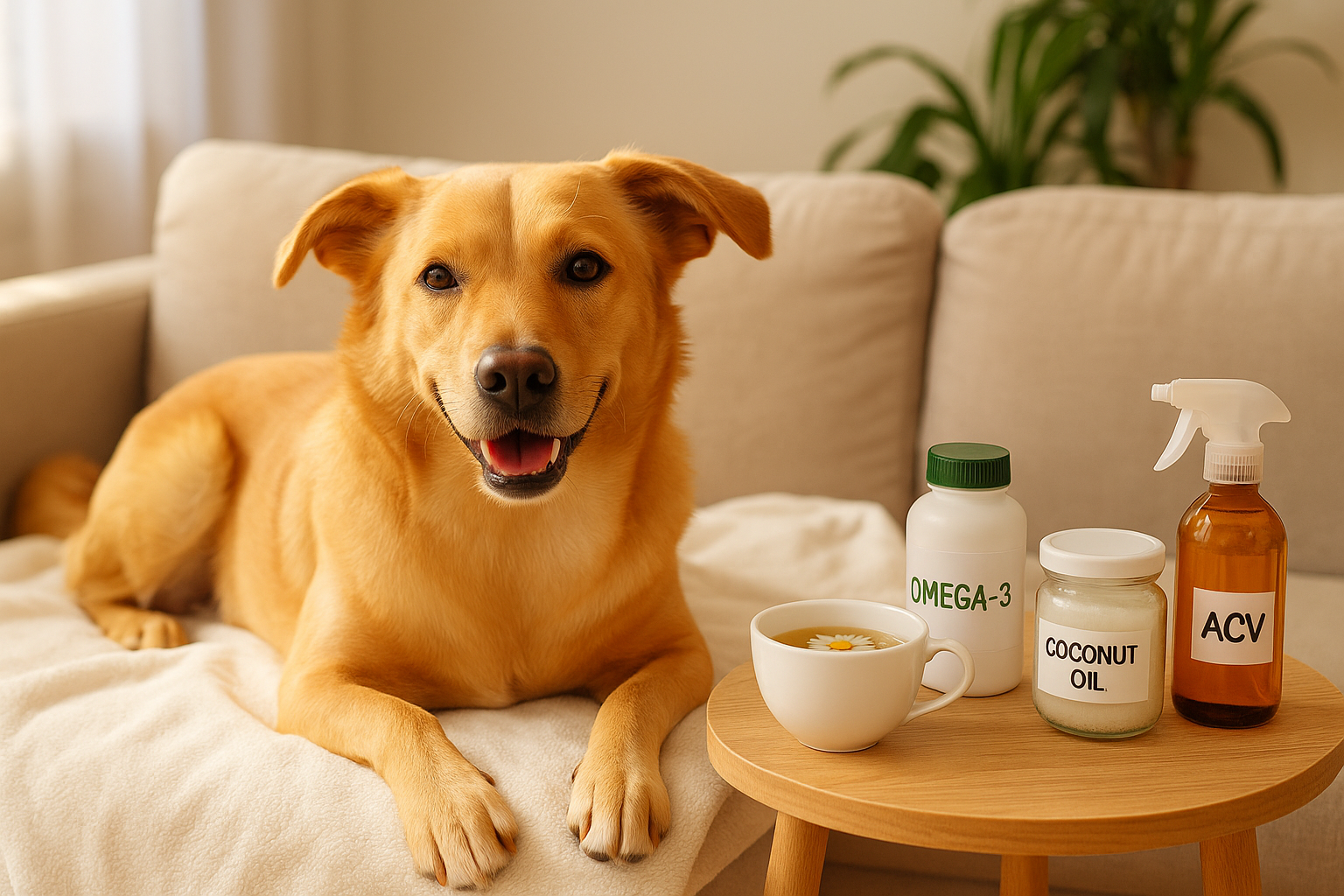



Pingback: Gut Health and Skin Conditions in Dogs: 2025 Best Healing Breakthroughs
Pingback: Proven Relief: How to treat Chronic Kidney Disease in Dogs (2025 Vet Guide)